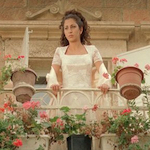 A few weeks ago I watched the very good, Oscar nominated Palestinian film OMAR (2013), followed by the same director, Hany Abu-Assad’s English-language DTV action movie THE COURIER (2012) starring Jeffrey Dean Morgan. Because that’s how I roll. I enjoyed those and want to watch some more from Abu-Assad, so the obvious choice is his earlier Oscar nominee PARADISE NOW (2005). But for now I wanted to watch one that’s not about terrorism, so I went with his 2002 film RANA’S WEDDING, aka JERUSALEM, ANOTHER DAY. This isn’t as much of a thriller as the others I’ve seen, closer to a romance, a story about a woman trying to marry her boyfriend on very short notice. It’s just about this character and this situation, but because of where she lives that can’t help but be political.
A few weeks ago I watched the very good, Oscar nominated Palestinian film OMAR (2013), followed by the same director, Hany Abu-Assad’s English-language DTV action movie THE COURIER (2012) starring Jeffrey Dean Morgan. Because that’s how I roll. I enjoyed those and want to watch some more from Abu-Assad, so the obvious choice is his earlier Oscar nominee PARADISE NOW (2005). But for now I wanted to watch one that’s not about terrorism, so I went with his 2002 film RANA’S WEDDING, aka JERUSALEM, ANOTHER DAY. This isn’t as much of a thriller as the others I’ve seen, closer to a romance, a story about a woman trying to marry her boyfriend on very short notice. It’s just about this character and this situation, but because of where she lives that can’t help but be political.
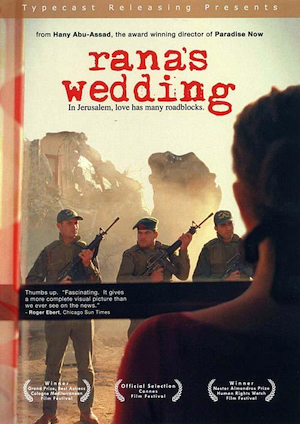 Rana (Clara Khoury, later in BODY OF LIES, THE INHERITANCE and Homeland) is a young Palestinian woman – 17 according to Wikipedia, though I guessed older – living in Jerusalem. Her father has decided to move to Egypt, and gives her a choice: either come with him and continue her ecucation, or stay and get married. He thinks she’s too young for that but gives her a list of who he considers suitable grooms – “All of them have a good job and come from a good family.” And she has to decide before tomorrow at 4pm.
Rana (Clara Khoury, later in BODY OF LIES, THE INHERITANCE and Homeland) is a young Palestinian woman – 17 according to Wikipedia, though I guessed older – living in Jerusalem. Her father has decided to move to Egypt, and gives her a choice: either come with him and continue her ecucation, or stay and get married. He thinks she’s too young for that but gives her a list of who he considers suitable grooms – “All of them have a good job and come from a good family.” And she has to decide before tomorrow at 4pm.
She doesn’t feel like settling on a future within those parameters, and comes up with a slightly different plan: find her boyfriend Khalil (Khalifa Natour, THE BAND’S VISIT), see if he’s willing to marry her immediately, and convince her dad to accept that. Khalil is not on the list, of course. He’s just a theater director, so Dad doesn’t like him.
Rana will have to worry about that part later. The first problem is that Khalil isn’t answering his fucking phone. Probly still asleep. She runs around to the different places he might be until someone tells her he had to stay the night at the theater in Gaza because of the bombing. So she heads there.
See, it’s a rom-com worthy premise: only ten hours to find her boyfriend (continually stopping at bathrooms to make sure she looks good, clean mud off her shoe, etc.), find someone to perform the wedding, convince dad to sign off on the wedding, prepare for the wedding (get her hair done, find a dress), and deal with every obstacle that comes up between every step. And they get in some arguments, she worries if this is a mistake, she gains confidence that it’s not, etc.
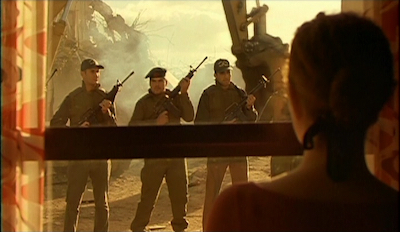 But most of her difficulties are region specific. Julia Roberts never did a scene where when she gets mad and almost throws her phone down a bunch of soldiers point guns at her. Rana accidentally leaves her bag somewhere, runs back to get it and a robot is detonating it as a suspicious package. Israeli squatters stare down at her from a wall, and she’s warned they’ll throw garbage. When she goes to a friend for emotional support they watch someone’s house being demolished next door.
But most of her difficulties are region specific. Julia Roberts never did a scene where when she gets mad and almost throws her phone down a bunch of soldiers point guns at her. Rana accidentally leaves her bag somewhere, runs back to get it and a robot is detonating it as a suspicious package. Israeli squatters stare down at her from a wall, and she’s warned they’ll throw garbage. When she goes to a friend for emotional support they watch someone’s house being demolished next door.
The tagline is “In Jerusalem, love has many roadblocks,” and of course that’s a double meaning. Her progress keeps getting held up by check points, roadblocks, and funeral processions. In fact (SPOILER) soldiers take the officiant’s ID and won’t let him cross so the entire wedding party has to come to him and do the ceremony inside a car.
For me one of the most effective scenes is when she’s traveling by bus but it gets held up so she has to get out to make the crossing on foot, and as she does there are little kids on either side throwing rocks at each other, plus the occasional adult tossing a molotov cocktail and the soldiers shooting rounds at them. There’s this feeling throughout the movie that Rana is a non-partisan trapped in the middle of all this, and she keeps her head down, her shoulders hunched, walking by. But at one point she picks up a rock and hurls it. Not well, not at anyone, but you can see the frustration there. When people are treating you that way almost anybody is gonna get fed up and take a side.
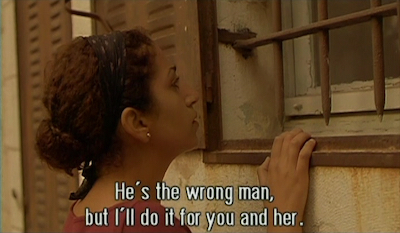 The movie is also very sympathetic toward Rana as a woman in a very patriarchal culture. Another scene that really hit me is when she finally gets everybody together to try to convince her father to let her marry Khalil, but she not only has no say in it, she has to stay outside. She’s running around the outside of this house listening through vents and windows as all these men argue and negotiate about her future.
The movie is also very sympathetic toward Rana as a woman in a very patriarchal culture. Another scene that really hit me is when she finally gets everybody together to try to convince her father to let her marry Khalil, but she not only has no say in it, she has to stay outside. She’s running around the outside of this house listening through vents and windows as all these men argue and negotiate about her future.
If I’d thought of Rana as being 17 I might’ve been more suspicious of Khalil, because that guy looks around 35! But the actors are actually the same age. He’s a good character – he seems at first like a sleaze who might be cheating on her, but then he immediately does want to marry her and is very sweet and funny with her.
I also really like the registrar (as the subtitles call him, but I guess he’s a sheikh) who the boys convince to come with them and a couple times he ends up in the car alone with Rana, trying to give good advice. She mentions her dad making a list and he’s like, “Let me see this list.” He can’t help but be curious. He notes that they’re “respectable” – a lawyer, an engineer, a doctor. Are you sure this guy you’re with is the right one for you? When she tells him about Khalil being a theater director he seems really impressed, says “Bravo.” More friendly to the arts than her dad. Or at least to the idea that she should be with who she loves.
Despite all the heavy shit going on here, Rana and Khalil manage to find some time for laughs, like when they pass the office of a lawyer whose name was on her dad’s list. She wants to see what he looks like so they pretend to have a legal matter for just long enough to get a peek at him and then run off. And that’s sort of the idea of the movie: that even in terrible times, you can have life and love and bits of happiness. But no one should have to work this hard for it, in my opinion.
At this point in his career Abu-Assad had done short films, documentaries, and the Dutch feature THE FOURTEENTH CHICK (1998). RANA’S WEDDING was his first Palestinian narrative feature. He worked with a Dutch cinematographer (Brigit Hillenius) and editor (Denise Janzee), but it’s based on a story by Palestinian author Liana Badr, adapted by Badr and Egyptian filmmaker Ihab Lamey.
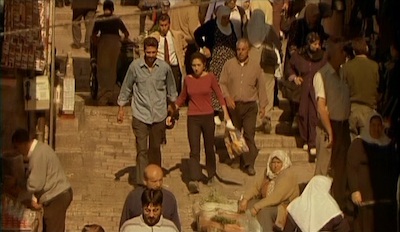 There’s a little bit of a student film feeling to it, with its piano only score, many montages of walking around, breathy voiceovers, and a few bits where Abu-Assad seems to be experimenting with different techniques. But all of this works. The very indie touch that most helps the movie is that a bunch of scenes appear to be shot guerrilla style, so there’s a real authentic feel to it, big locations with many real people walking around.
There’s a little bit of a student film feeling to it, with its piano only score, many montages of walking around, breathy voiceovers, and a few bits where Abu-Assad seems to be experimenting with different techniques. But all of this works. The very indie touch that most helps the movie is that a bunch of scenes appear to be shot guerrilla style, so there’s a real authentic feel to it, big locations with many real people walking around.
It was filmed in East Jerusalem in the early months of the second intifada (a four year period of heightened violence that killed about 1,000 Israelis and 3,000 Palestinians). Abu-Assad later told an interviewer “For sure the intifada influenced the production because at the end of the film, reality is stronger than fiction. The occupation, the checkpoints — you don’t want them to interfere with your story but the ugliness of occupation influenced the look of film.” In the same interview, he said that the common theme of Palestinian films is “the resistance against the aggressor”:
“Through military power, economic and political power they try to limit your human and basic rights. By not giving up it becomes a theme — not giving up and continuing with your life and identity.” That’s what’s so great about RANA’S WEDDING. It can’t help be about the occupation, but that’s in the background of Rana living her life in spite of it.


























March 14th, 2024 at 3:17 pm
I don’t have a ton of affection for this director but it’s very cool you reviewed this.